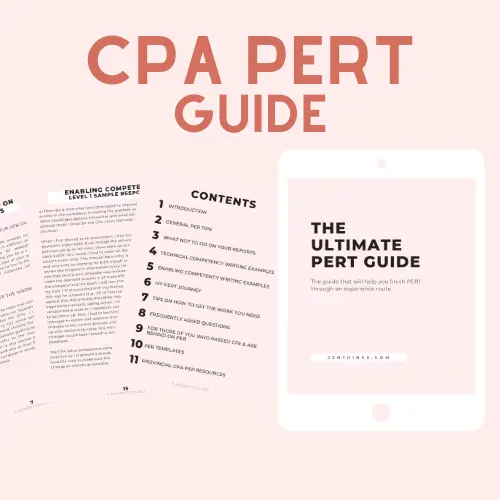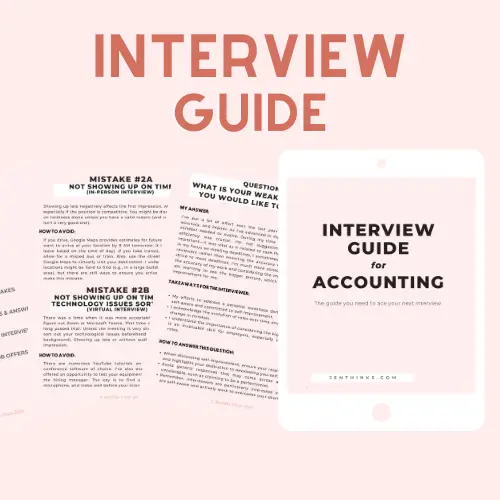Three companies, five years and seven titles. Since I started as an AR/AP clerk in 2017, I have been learning and growing as a finance professional. Along the way, I have both made mistakes and exceeded expectations. I have also met people I looked up to and people I would rather not cross path with again.
So far, I have enjoyed my career as an accountant. I find my job manageable and challenging at the same time. With my recent CPA designation, I feel that more doors have opened for me. Right now, I am exactly where I want to be. However, I have not always felt so confident and sure about where I was and what I wanted. I have been learning from experiences and also from others.
In this post, I want to share the career lessons I learned with those of you who are just starting their finance career.
Take Care of Yourself First.
I have said this many times in my posts because it is one of the most important lessons I have learned. In fact, I apply this to all aspects of my life. However, I don’t want you to confuse this with being selfish because taking care of yourself first does not mean disregarding other people’s well-beings. It simply means you need to focus on doing what it takes to be in the best shape you can be before worrying about others.
At work, this means taking care of your own workload first. Early in my career, I was a lot more eager to please. This means I would jump at the first opportunity to help others out because I wanted to be seen as cooperative and a team player. I entered the corporate world with that mindset because the interviewer would always ask whether you are a team player. However, at what cost? What if I postponded something urgent to help my colleague with something that was not due for another week? Also, what if someone else was depending on you completing your task so they can start reviewing them? An example would be setting up vendor payments (true story as I spent a couple of years in AP). Where I worked, two approvers would be waiting for me to finish setting up payments before they can start the review process. If I fell behind on payments because I decided to help a colleague with something else first, my approvers might have to stay late or rush to approve before the deadline.
The reality is, when you are new, you likely don’t have the answer to those questions. You will not have visibility on all the moving pieces within the department. This is absolutely fine because you are learning. When you are just starting in your career, it will take a while before you see the big picture. This is what you should expect of your manager – for them to see the big picture and delegate properly.
Outside of work, this means taking care of your mental and physical health. I have met people who mistakenly always put work first and completely neglected their physical and/or mental health. Sometimes, they would be forced to stop when they finally reached a limit (e.g., burn-out). You need to understand not everyone is built to work non-stop for 12+ hours day, five days a week for a prolonged period of time. You might feel fine physically for now (especially if you are reasonably healthy and have few responsibilities outside of work), but what about your mental well-being? Are you happy? Do you not want to spend more time with family, friends or just by yourself doing what gives you joy?
What I have learned is this: when I am happy and fully rested, I perform the best at work. I focus better and think more clearly. I exercise regularly (but I only started this year) and I relax in the evenings and on the weekend. I take care of myself so I can take care of what is on my job description.
Stay Curious & Ask Questions.
Recently, I came across a CPABC article for people who are thinking of switching roles in finance by Michelle Singerman. In the article, she said there is an increased interest in “knowing what else you can do” as a jobseeker. Questions such as whether you have been continually upskilling are becoming more and more common. It does not matter whether you are new or have been in the industry for many years, staying curious is one of the keys to success.
At one of my old jobs, we would have these weekly meetings. The purpose of the meeting was to share what everyone was working on that week and allow people to ask for help if they needed it. I was working in AP then and those meetings were a chance for me to learn more about the other side of finance as the accounting team was also present. So, whenever I was unclear on something, I asked. My colleagues were used to me being the one with many questions and would help whenever I needed assistance. The important thing was, I took something away every time from these weekly meetings. I gained knowledge that I continue to apply daily at work.
I know some of you will be naturally curious like me and I want you to know that you should always ask if you are unsure about something. A lot of the time, asking clarifying questions would help minimize confusion and mistakes. From my experience, as long as your questions are valid and relevant, your colleagues will be understanding and reasonable (and if not, the problem is with them and not you).
It is important to note that asking questions does not mean you are clueless. I know some people avoid asking questions because they don’t want to be seen that way. However, making assumptions and guesses when you are not sure about something could lead to more work for everybody than simply asking a clarifying question . Also, thoughtful questions actually show that you have critical thinking skills and will be looked upon favorably by whoever is training/mentoring you.
Regularly Ask Yourself This, “Is It Worth It?”
My entire post on working overtime in accounting revolved around this question – is it worth it? However, I want to extend the discussion beyond working overtime. In the introduction of this post, I mentioned I have held seven different titles with three companies. When I first started my finance career, I might not have been as strategic with my choices as I have been in the last couple of years. However, I have always asked myself whether whatever I was doing or working towards was worth it.
When I needed more advanced experience than what I could get in AP in order to get my CPA, I explored my options and fought for what I needed. Eventually, I left the company I was with to pursue another opportunity. That move was worth it for me as I passed CFE and finished PERT with my new employer. When I had to return to work for month-end after the first part of my CFE leave, it was also worth it because I showed myself and my managers I was capable of handling both without burning out. After I got my CPA, I decided to stay with my employer in hopes that I would get promoted when I could have pursued opportunities externally. It was also worth it as I got exactly what I wanted after asking for it more than once (which is why my next point is important).
Throughout your career, you will face many different choices and decisions. Some are harder than others and some have a much bigger impact than others. You need to know that in most circumstances, you have a choice. If you don’t think it’s worth it, it’s not. Sometimes, we get distracted by what the society or other people want from us. However, at the end of the day, it is your life. Only you would know if the endgame is worth the cost.
If You Don’t Ask, You Don’t Get.
Early in my career, like many others I know, I naively thought good things would just happen to you if you do everything right. From showing up to work on time, helping colleagues out whenever possible, taking on extra responsbilities when asked to working overtime to cover for vacation and following instructions as told. However, the world simply does not work that way. Does that mean good things don’t happen to good people? No. But it is best for you if you take proactive measures to stay control of your own career.
Shortly after I was promoted to a team lead role in AP, I evaluated what was required to get my CPA (which was my number one priority). That was when I realized it was time for me to get more advanced experience in accounting and/or financial analysis in order to satisfy PERT (work experience component for my desigantion). Since I had an interest in financial planning, I expresssed my interest and communicated that to my manager at the time. Unfortunately, for many reasons, it just did not work out. So, I explored external opportunities and left when I found the right one (lucky for me, it did not take long so I stayed on track and got my CPA as scheduled). I would never know for sure what would have happened if I had stayed at the time (e.g., maybe I could have gotten into financial planning at the end or maybe I would still be working on PERT). The key is, I took control of my career by asking for what I needed and leaving when my employer could not provide it at the time.
When a more challenging position opened up on my team, I applied and was offered the role even though only my job description would change (it was a lateral move). However, what I did ask for was a more senior title. I did not get it at the time but I brought it up again after I passed CFE six months later. This time, my manager and I had an in-depth discussion and a plan was formed. Even though I still did not get the promotion then, I got a roadmap that was more than fair. Another six months later, I got my designation and my promotion.
Based on the stories I heard from my network, I know I am not alone in this. From raises to promotions, the best thing you can do to take control of your career is to ask and support your request with back up (e.g., accomplishments, responsibilities, market trend). Not asking does not mean you will never get a raise or a promotion, but taking proactive measure improves your chances because a dialogue can be opened. Maybe your manager supports you but feels that you need more exposure in an area (e.g., public speaking skill). Or you might find out there simply is no room for upward movement. With this knowledge, you can decide what you want your next move to be.
Being Laidoff Is Always A Possibility & It’s Fine.
If you are reading this in 2022, you are probably sick and tired of the high inflation and interest rates hike news. Everyone is worried about the economy and several tech companies have already gone through at least a round of mass layoff. When I polled on Instagram the other day, over 50% of you said you weren’t worried about being laid off because your job is secured. The others were split between feeling like there was nothing they can do anyways or worried about losing their jobs. However, my thoughts on this topic is this: because no one is irreplaceable, there is always a chance you will be laid off and that is absolutely fine. Companies don’t layoff only when the economy is bad. There are many other reasons they decide to do that such as re-structuring, mergers or even automation. However, does that mean you need to live in fear in hopes that your name will never make the cut list? No.
If I converted my annual salary from my first accounting job to hourly, I barely made more than what I did working retail. Because of that, I had the mindset that it would not have been the end of the world if I got laid off because my income would be replaced easily. Then, as I moved up the ladder and made more, that mindset stopped making sense. I would not be able to make the same hourly pay if I went back to work retail like Starbucks.
Over the years, I did learn to not let that bother me or change the way I work. Obviously, I appreciate the steady paychecks. However, I planned and managed my finances in a way that I would not immediately go into deficit if I lost my job suddenly. On top of that, in BC, workers are legally entitled to a minimum amount of severance based on the length of service. Depending on your specifc circumstances, it might also be worthwhile to consult with an employment lawyer.
One golden rule you need to remember if you are laid off is this: do not sign anything without reading and understanding every single word. When I worked for a small business years ago, I was once asked to sign a release statement (giving up your rights to sue your employer on matters relating to the employment or termination of the employment) after my final day of work but before my final pay. Note, I quit and there was no legal disputes between us. However, it was their way to protect themselves legally even though signing the release statement offered no benefit to me. It was one of those things that even though it would not have hurt me to sign since my rights to sue was meaningless in that case, there was no reason for me to give them away. I was really young back then and I would not be surprised if they expected me to just sign it.
With all this being said, I want to highight that my view on job security makes me a better employee. Knowing that this relationship could theoretically end anytime (initiated by either party), I make the decision to stay every day. It motivates me to work hard both at work and outside of work so I can offer more value to my employer and to myself. At the end of the day, what I learned is mine to keep. If my employer decides to stop paying me to do my job, I will simply move on and apply my skills elsewhere.


